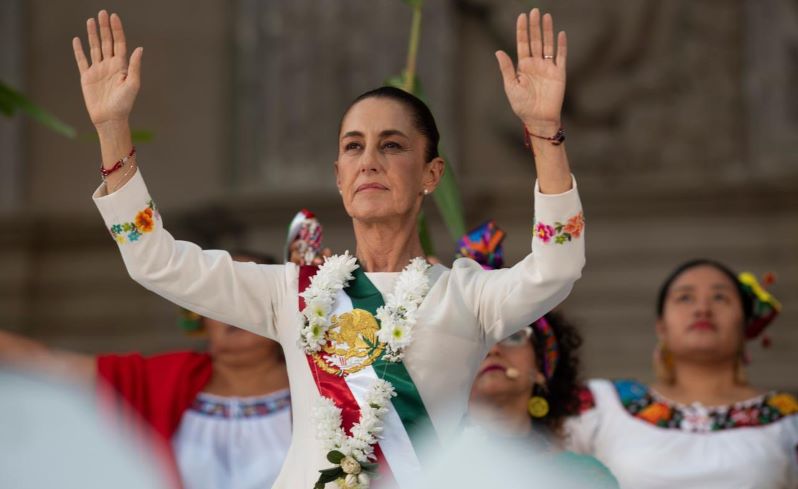MEXICO CITY: In a momentous ceremony on Tuesday, Claudia Sheinbaum was officially sworn in as Mexico’s first female president, marking the start of her six-year term. Her inauguration represents a significant milestone in Mexican history, occurring 70 years after the nation granted women the right to vote.
Addressing an enthusiastic crowd gathered in Mexico City’s iconic Zócalo square, Sheinbaum delivered an impassioned speech, acknowledging the historical weight of her victory. “I do not come here alone,” she declared. “I stand with all the women of Mexico.” She followed this with a firm denouncement of societal ills: “No to racism, no to classism, and no to machismo.”
The massive square was packed with supporters and loyal members of the ruling Morena party, whose flags and cheers set a celebratory tone. A close ally of outgoing President Andrés Manuel López Obrador, Sheinbaum vowed to uphold and expand his progressive agenda, which has focused on uplifting the country’s most vulnerable.
“I am a mother, a grandmother, a scientist, and a woman of faith,” she stated in her inaugural remarks. “Today, by the will of the people of Mexico, I take on the honor of serving as the constitutional president of the United Mexican States. I will not let you down. Together, we will continue to make history.”
Sheinbaum laid out an ambitious roadmap for her administration, highlighting key social and economic reforms. She committed to raising the minimum wage, expanding pension programs, and reducing the country’s workweek from 48 to 40 hours—a gradual but critical shift toward improving labor conditions.
On the international stage, Sheinbaum emphasized the importance of deepening economic ties across North America, particularly through the U.S.-Mexico-Canada Agreement (USMCA). She stressed that her government would harness the potential of nearshoring to stimulate job growth and fortify Mexico’s economic position in the global marketplace.
She also placed a strong emphasis on human rights, vowing to uphold the dignity of all citizens. “We will ensure respect for sexual and cultural diversity,” she affirmed, while underscoring the need for greater opportunities and protections for women across the nation.
Sheinbaum secured a landslide victory in the June elections, capturing nearly 60% of the popular vote—a resounding mandate from the Mexican people. With the Morena party holding a commanding majority in both chambers of Congress, she enters office with unprecedented political power and the ability to enact transformative policies.
Observers anticipate that Sheinbaum will remain closely aligned with the political path set by López Obrador, who leaves office as one of Mexico’s most beloved presidents, with approval ratings nearing 70%. She echoed his populist ethos in her closing remarks, stating: “I will dedicate my knowledge, my energy, my story, and my very life to serving the people and our homeland. Together, we will build a more prosperous, free, democratic, sovereign, and just Mexico.”
The historic nature of Sheinbaum’s presidency, combined with her promises of reform, positions her as a key figure in shaping Mexico’s future in the years to come.





